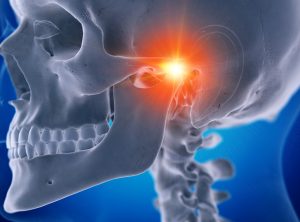 Temporomandibular joint (or TMJ) disorder is a complex condition. It can affect a large number of people of all ages, but its specific manifestation and the symptoms that it produces can differ for everyone who experiences it. Sometimes, these symptoms can be minor enough to find temporary relief with one or more at-home remedies, such as for jaw pain or a bad headache. However, when TMJ disorder grows more severe, so do the symptoms it causes, and seeking appropriate TMJ disorder treatment might be the best thing to do for your oral health.
Temporomandibular joint (or TMJ) disorder is a complex condition. It can affect a large number of people of all ages, but its specific manifestation and the symptoms that it produces can differ for everyone who experiences it. Sometimes, these symptoms can be minor enough to find temporary relief with one or more at-home remedies, such as for jaw pain or a bad headache. However, when TMJ disorder grows more severe, so do the symptoms it causes, and seeking appropriate TMJ disorder treatment might be the best thing to do for your oral health.
How your jaw joints should function
Your TMJs are an intricate part of your oral health bite function. Each joint is located on either side of your jaw, just underneath your ears, and together, they move in tandem to allow your lower jaw to open and close smoothly. The proper function of your TMJs relies heavily on proper balance and alignment. Your teeth, jawbone, and other oral structures must be aligned and functioning properly for both of your TMJs to remain properly aligned as they move. Otherwise, one or both joints may become damaged due to excessive, imbalanced pressure, leading to a range of specific types of TMJ disorder.
Dealing with a TMJ disorder
Because TMJ disorder means different things to different people, determining if it’s the cause of your chronic discomfort can be difficult. For example, depending on the specific type of TMJ disorder they experience, people with it may find themselves dealing with one or more of the following:
- Sore, achy jaw joints and muscles
- Muscle pain in different facial areas
- Popping or clicking sensations in the jaw joints
- Chronic headaches and migraines
- Ringing and/or pain in one or both ears
- And more
What customized treatment could accomplish
When you have TMJ disorder, the symptoms it causes can also include diminished function of your bite overall. Every time you bite and chew, your jaw joints and muscles may grow increasingly painful or exhausted. The alignment of your bite may suffer, forcing your TMJs to accommodate the imbalance and become even further damaged. For many people, treating TMJ disorder with a custom-designed appliance and/or treatment plan can help alleviate current symptoms and improve the overall function of their bite. It can also reduce the risks of further oral health complications developing as a result of improperly functioning jaw joints.
Learn if you need treatment for TMJ disorder
If your chronic aches and pains are the result of a TMJ disorder, then seeking appropriate professional treatment may be important for finding relief. To learn more about how, or to schedule a consultation, call Cedar Dental in Cedar Rapids, IA, today at (319) 364-7108.




Recent Comments